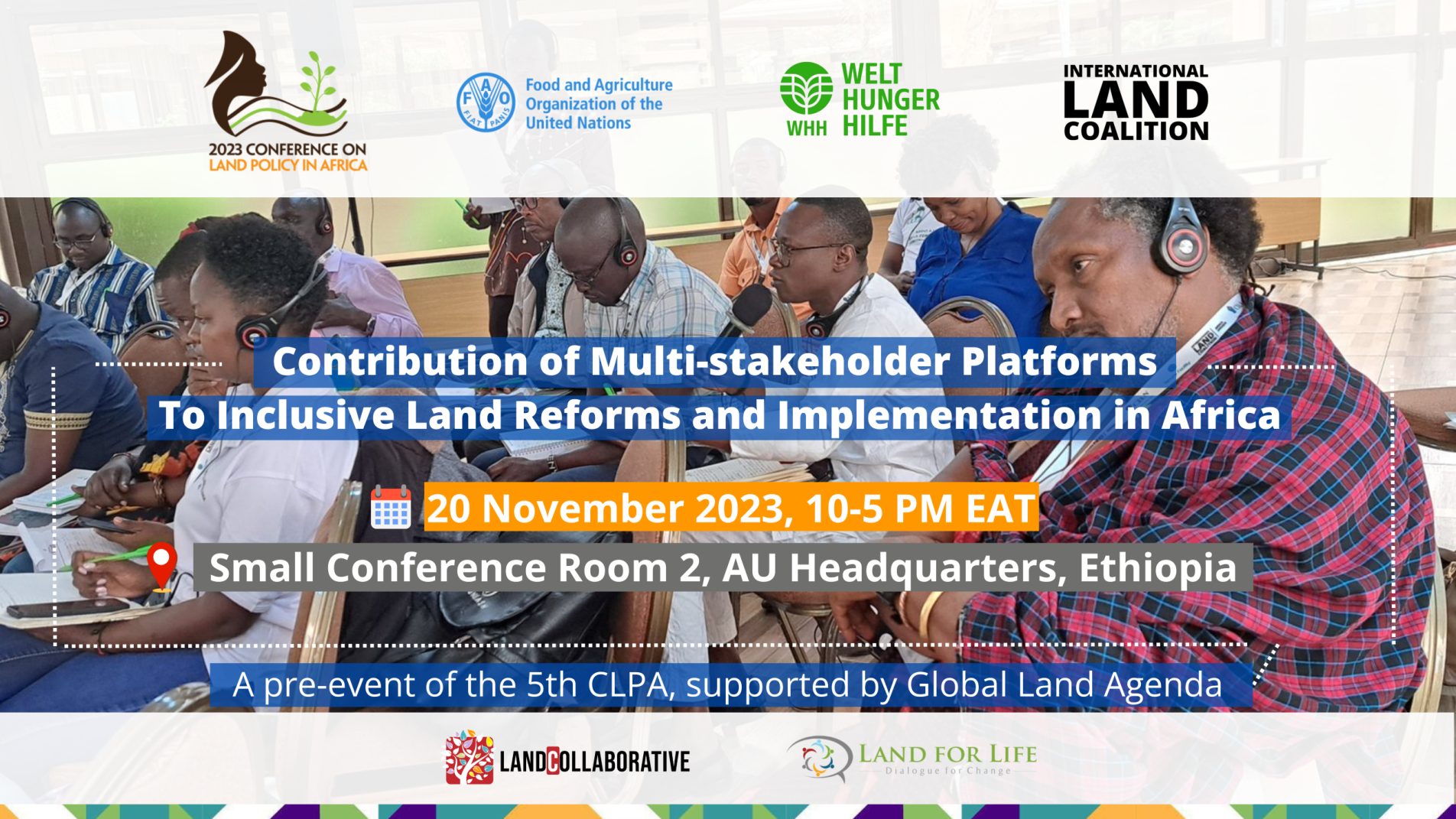- By Priscilla Toto
- 9. January 2024
- 0 Comments
WHH/Land for Life co-organized a Pre-Event to the Conference on Land Policy in Africa CLPA 2023 in Ethiopia: “The Contribution of Multi-Stakeholder Platforms to Inclusive Land Reforms and Implementation in Africa.”
“Land is at the center of any form of development” stated Hon. Judith Nabakooba, the Minister of Lands, Housing & Urban Development of Uganda in her opening statement. “The Ugandan government assures to include and mobilize all relevant stakeholders, including traditional leaders, CSOs, local governments, women and youth, in the ongoing review of the national policy”. Committing to the centrality of multi-stakeholder processes in land governance, she opened the floor for a day of in-depth discussion on MSP and their experiences, challenges, and potentials for inclusive land reform in Africa.
The Conference on Land Policy in Africa (CLPA) convenes hundreds of various stakeholders for inclusive policy dialogue and knowledge exchange on land governance issues in Africa and thus offered an ideal space for the thematic exchange on land reform and MSP.
Context:
Prior to the conference, On November 20, 2023, Welthungerhilfe (WHH) and Land for Life, together with the Food and Agriculture Organization of the United Nations (FAO), the International Land Coalition (ILC), and the African Land Policy Centre (ALPC) organized a pre-event to the conference on the “Contribution of multi-stakeholder platforms to inclusive land reforms and implementation in Africa.” The event was also held at the African Union Headquarters in Addis Ababa, Ethiopia, and gathered around 50 government representatives, NGOs, producers’ organizations, and development partners. It aimed to spark discussion on and promote effective multi-stakeholder processes for inclusive land reform and implementation in Africa, to contribute to achieving the Africa 2063 Agenda and the SDGs by ensuring equitable land governance and secure tenure rights for all. It was a chance to share Land for Life’s experiences and learnings with an array of relevant actors and gain insights from other practitioners, policymakers and development partners in Africa.
Key Discussion Points:
A panel of high-level government representatives kicked off the pre-event to discuss inclusive land reforms. In sharing their experiences in land policy reforms from their respective countries, government representatives from Uganda, Chad, and Sierra Leone highlighted the crucial role of land governance in achieving development goals. As reflected in the quote of Hon. Nabakooba from Uganda, Multi-actor partnerships were hailed as an effective approach to ensure sustainable and inclusive land reform by the involvement of diverse stakeholders – including traditional authorities, civil society, local government institutions, women, and youth.
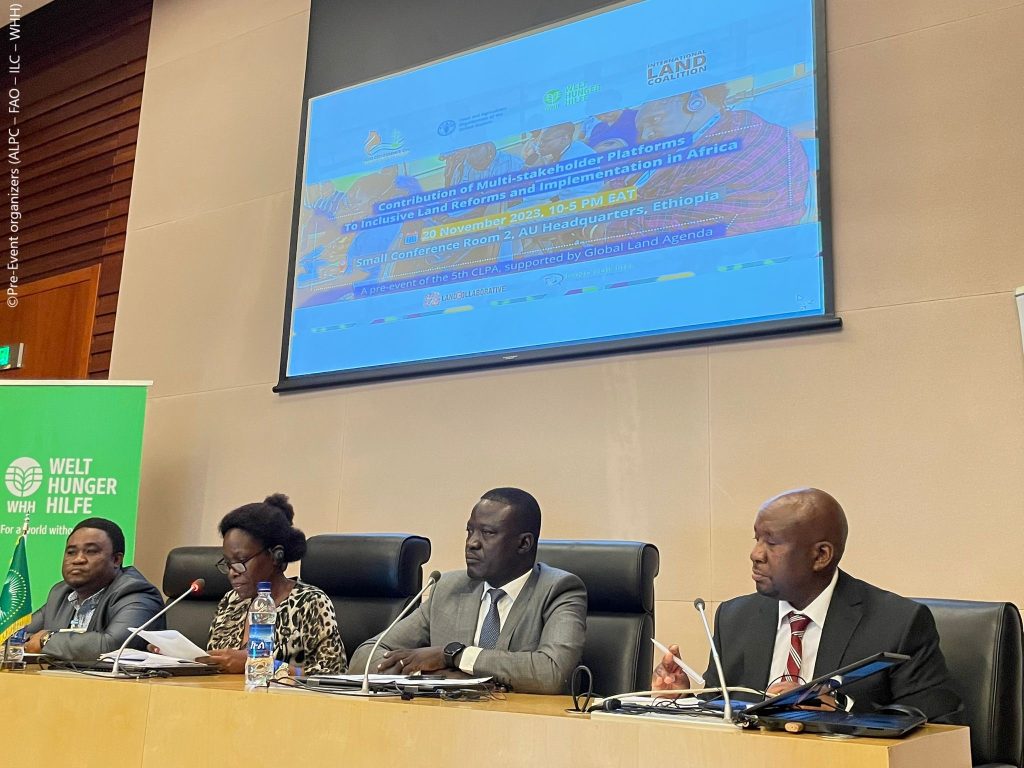
A key point of deliberation was the role of international tools such as the Voluntary Guidelines on the Responsible Governance of Tenure (VGGT) and Framework and Guidelines on Land Policy (F&G) on informing land reform processes in Africa. The VGGT serve as a voluntary tool inspiring land reform as they emphasize inclusive processes and the rights of vulnerable populations, complimenting the F&G. Anna Schreiber, Program Coordinator of the Land for Life Initiative, shared the insights from the joint WHH, FAO, ILC and GIZ “VGGT+10 initiative”. “There is a lot to celebrate” she reflected on the developments of land reform in Africa. More than a decade since its inception, the VGGT have increased compliance in land reforms, participatory decision-making and strengthened women’s and community land rights across Africa and beyond. Since the adoption of the VGGT in 2012, organizations such as the FAO, ILC, and WHH have supported over 35 countries in establishing Multi-Stakeholder Platforms (MSP) on land reforms in line with the VGGT recommendations. Yet also common challenges could be identified and were validated by many of the attendants of the pre-event. These include lacking implementation of existing laws, limited financial and human resources for an effective and decentralized land administration and missed prioritization of the right to food in decision-making on land.
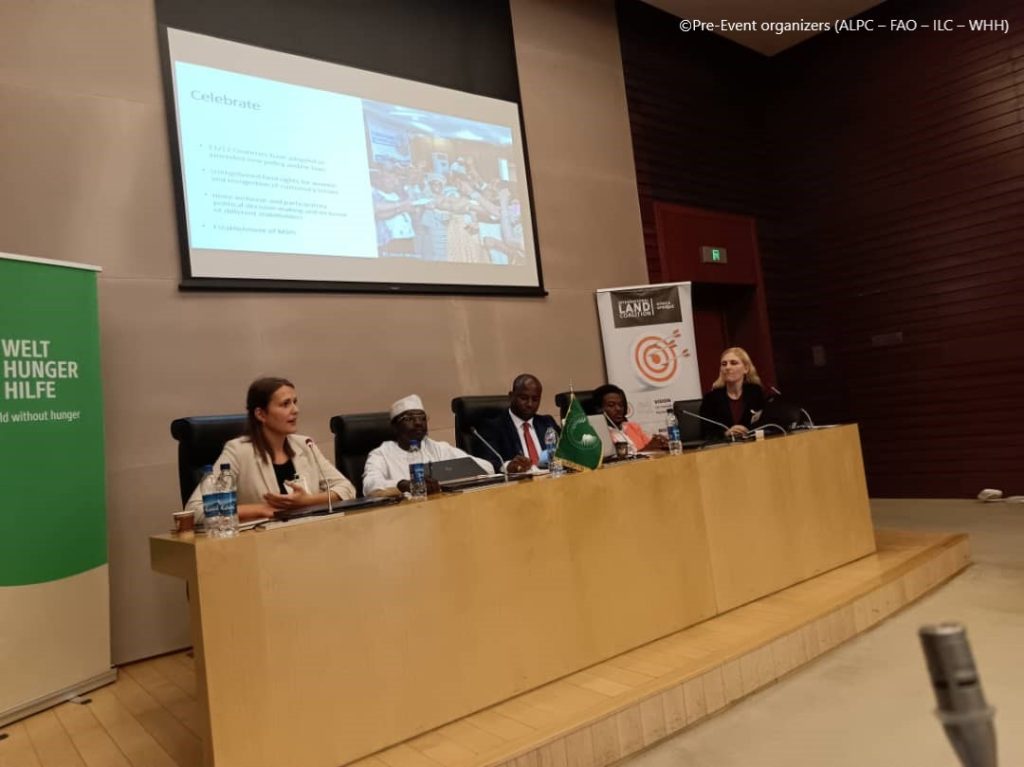
MSP Practitioners various African countries were present to share their experience in land reforms in their respective countries, including representatives from MSPs supported by the Land for Life Initiative. John F. Kelvin highlighted the role the MAP Liberia Land Platform in the development, adoption and implementation of the Liberia Land Rights Act. For him, the roles and relationships between the governments, CSOs and the private sector are the main drivers of change: “There is a new atmosphere of purposeful, frank and honest dialogue based on mutual respect and trust and not on naming and shaming, which were the predominant characteristics of our previous relationships”. He also stressed the importance of continued collaboration not only for the reform process itself. The MAP in Liberia played an important role in the dissemination of the laws after its adoption, in the development of regulations and the coordination of the law operationalization.
Although MSPs are critical in inclusive land reforms, there remain some obstacles to the effectiveness of their processes. John F. Kelvin identified lack of a comprehensive framework to guide the land sector and gaps in women’s participation to be among the challenges faced by the MAP in Liberia in implementing land laws after their adoption. Berns Komba Lebbie from Land for Life Sierra Leone highlighted that the effectiveness of MSPs is highly dependent on a favorable political climate and political will, the necessity for flexible and long-term funding, and the involvement of the grass-roots-level and marginalized groups.
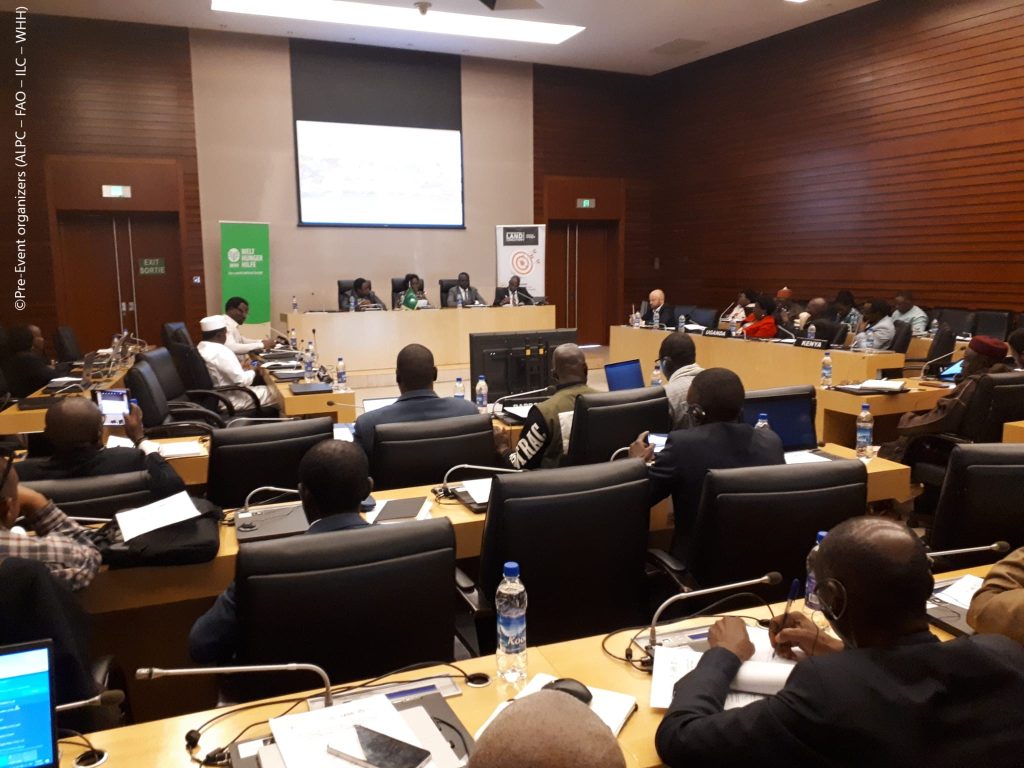
The various panels and sessions, with the participation of the ALPC, IGAD, the West African Economic and Monetary Union (UEMOA) and the African Traditional Authority Forum (ATAF), the World Bank, RVO, GIZ and the Global Land Agenda, allowed for the organic emergence of further overarching challenges and discussion outcomes. MSPs have proven to be critical in policy development, implementation, and monitoring at the national level in Africa. However, there is a need to connect national land reforms at the regional and global levels. Globally, it is important to anchor land issues firmly on international agendas and multi-level MSP might be a tool to foster that. One outcome of the event was the joint plan to pursue an MSP on land governance at the continental level in Africa. Furthermore, land governance is a cross-cutting issue and should not be treated in isolation. The success of upscaling land governance issues from national to global levels also depends on a shift in the land governance narrative to be widened and linked to other issues such as climate change, biodiversity, gender, migration, and many more.
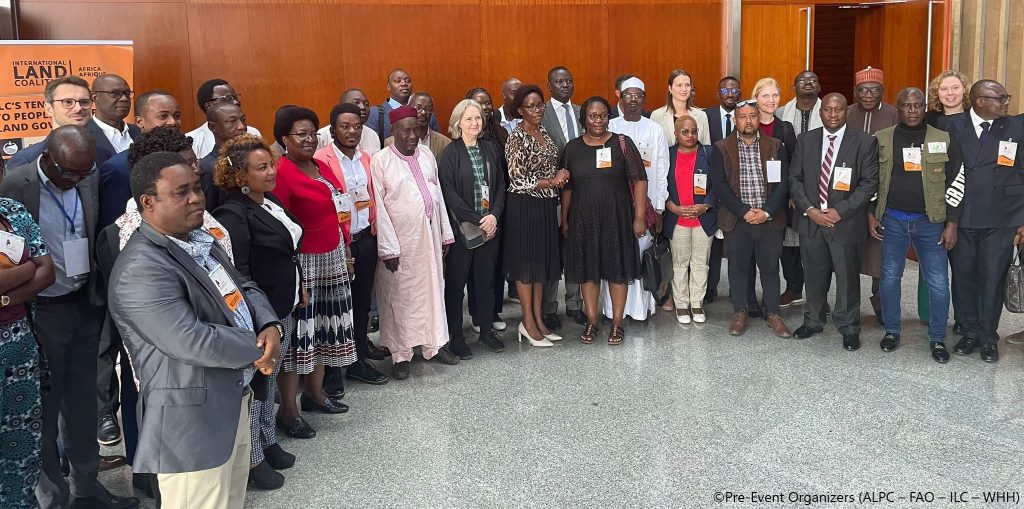
Key Recommendations and Take-aways:
The rich deliberation between the pre-event’s speakers and attendees from various sectors resulted in the compilation of numerous recommendations and take-aways:
- Strengthen international partnership and coordinated efforts to support MSPs, inclusive land reforms, its implementation, and scaling of successful pilots in Africa.
- Build more spaces for the inclusion of grassroots level actors in MSP, political decision-making as well as in regional and international fora.
- Ensure embeddedness of MSPs in the implementation processes of laws, especially at the decentralized level.
- Support the sustainability of MSP, by ensuring their inclusiveness, long-term joint vision, and suitable funding mechanisms including support from the governments.
- Integrate land stronger with topics like climate, biodiversity, peace, urban land governance, digitalization, and migration in discussions and actions on land
- Further strengthen the support of data generation and sharing through land observatories at different levels (local, national, regional and global.
These recommendations also fed into the “Call to Action” presented by the various stakeholder groups at the closing of the overall CLPA 2023 (yet to be published).
by Priscilla Toto
09.01.2024

